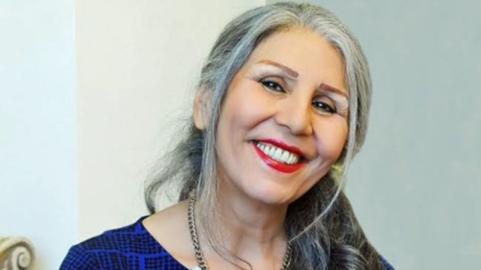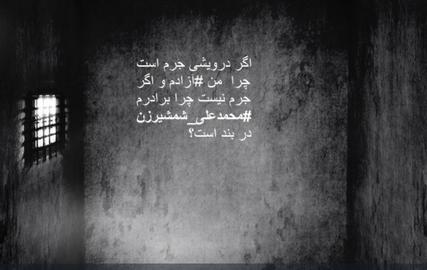Mahvash Sabet, the Baha’i poet and teacher brought to international renown for the poetry she wrote during her 10-year incarceration in Evin Prison, has been awarded the PEN Pinter Prize, which she shares with Irish poet Michael Longley.
The award, which was presented at an awards ceremony on 10 October in London, is given each year to a British, Irish or Commonwealth writer whose work looks at “the real truth of our lives and our societies.” The winner shares it with an International Writer of Courage persecuted for their work in another part of the world.
Sabet was released on September 18 after serving 10 years behind bars for her religious beliefs and for helping her fellow Baha’is in Iran pursue education. Iranian authorities deny Baha’is the right to attend university.
Sabet’s Persian poems were discreetly shared from inside jail and adapted into English by the Iranian-British novelist Bahiyyih Nakhjavani. The book, Prison Poems, was published in translation in 2014.
Speaking about his decision to choose Mahvash Sabet to share the prize, Michael Longley told IranWire in an interview: “I was struck by Mahvash's soaring ecstatic poetry. There were some really quite positive magical charge to her imagination. And she had in her poetry refused to let the dark forces that imprisoned her get her down or diminish her soul. It was the straightforward courage and beauty of her imagination which suggested that I might choose her. And I'm very glad I did.”
Longley was chosen by a panel of English PEN judges for “his effortlessly lyric and fluent poetry ... suffused with the qualities of humanity, humility and compassion, never shying away from the moral complexity that comes from seeing both sides of an argument.” Born in Belfast, Northern Ireland in 1939, Longley is known as a love poet and a nature poet – but most especially for his work reflecting the 1968-1998 civil unrest, known as the Troubles, in Northern Ireland.
Asked whether he could see any synergy between his poetry and Sabet’s, Longley said, “I think we're both celebrators of the natural world... We're concerned for justice and the dignity of the human individual. These are things which occupy us. I aspire myself to what you might call lyric intensity, and her poetry is lyrically intense. I think we're both lyric poets, but she has had this dreadful imposition, years in prison. She has been abused, and insulted in a way I find it very difficult to imagine.”
Poetry in Violent Times
Longley, whose PEN Pinter prize address focused on “poetry in violent times,” said his political poems about Northern Ireland were “an elegy for innocent people, some of them children, who were caught in the crossfire.
“And I think if Mahvash had lived in Ulster in Northern Ireland,” Longley said, “ She would have adopted a similar approach.”
Although the grim political situation in Northern Ireland spurred on some of Longley’s most compelling and emotional work, he said he never shied away from difficult subject matter. “I opposed the terrible certainties of those who believe in an exclusively green Ireland, or an exclusively orange Ulster, both death-dealing, inadequate concepts. I did not pull my punches or self-censor.”
Sabet faced harsh censorship, and was imprisoned for her work and for her educational pursuits for Iran's Baha'i communities. Longley said through reading Prison Poems and finding out about Sabet’s case from PEN, he became aware of just how “perverse” Iran’s legal system could be. “Mahvash and her colleagues were kept in prison without legal advice, and their cases just postponed again and again and again,” he told IranWire. “They were held incommunicado for months and not allowed legal counsel. It's a travesty of how the law should operate, especially when what's at stake is the freedom and the dignity and reputation of distinguished human beings, of creative souls.”
Before her release in September, Sabet served 10 years behind bars. She was one of the seven members of the former leadership group of Iran’s Baha’i community, all of whom were jailed in 2008, and who initially endured 20 months of detention without hearing any charges or going to trial. The seven were eventually sentenced to 20 years in prison – later reduced to 10 years after changes were introduced to the penal code.
The book Prison Poems gained widespread recognition after Sabet’s original writings were discreetly transported from prison. Sabet called the award a “wonder to me” and a mystery” in her acceptance remarks – delivered by Nakhjavani.
“The hardest thing,” Sabet added, “is to know that even though I am walking free, many other friends and colleagues still remain behind bars.”
As Nakhjavani writes in her personal account about the night Mahvash Sabet was released, “Nothing had prepared me for her nonchalant grace after so long in prison.” And she celebrates Sabet’s ability to move beyond her prison experience. “Her poems recorded the heroism of maintaining joy in those impossible conditions. She was not wallowing in grief; she had no illusions about herself. She was simply trying to lift her spirits and those of others as high as she could above those walls.”
Longley, too, celebrates Sabet’s courage and humility. “She was prepared to die for her beliefs,” he said, “and I can't imagine myself being that brave.”
Sabet also praised the work of English PEN for “championing my cause”, adding: “When I suffered in prison, your compassion sustained me; all through those dark years, your sincere support encouraged me. You are an example of advocacy to people of goodwill everywhere, including journalists and activitists among my own compatriots, and even certain clerics in Iran.”
Longley, who like PEN and so many free speech advocates, said he was overjoyed when he heard the news that Sabet had been released. “Perhaps when things have settled down in her life, we shall talk, and it would be grand to meet her,” he said.
Michael Longley was interviewed by Natasha Schmidt
Read more about the work of English PEN
visit the accountability section
In this section of Iran Wire, you can contact the officials and launch your campaign for various problems


























comments